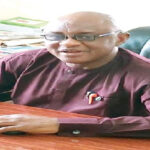
The Managing Director, NAMA, Adetunji Odunowo, disclosed this at the sideline of the recent consultative meeting on the development and deployment of Sustainable Aviation Fuel Low Carbon Aviation Fuel and Aviation Cleaner Energies on Thursday in Abuja.
Odunowo called on all stakeholders in the aviation industry to work with the acceptable standard practice in order to collectively attain the achievement.
He added that effective collaboration among the relevant government agencies could lead to a 50 percent carbon emission reduction.
The Minister of Aviation and Aerospace Development, Festus Keyamo, also called for the deployment of cleaner aviation energies in Nigeria.
Keyamo said the preservation of the national environment by commitment of high-level representation in the consultative meeting will enhance standards in the aviation sector.
“I am highly honoured to be among this eminent gathering of policymakers, regulators, professionals and industry stakeholders.
“Cross session of a consultative meeting that is borne out of the desire for Nigeria to develop a clear roadmap.
“Also targeting the use of cleaner energy in aviation, in accordance with the International Civil Aviation Organisation (ICAO) Resolution on the global framework on aviation cleaner energies.
“This step is not only laudable but necessary for our airlines to be able to have a competitive operating advantage not just in our region but in the continent.”
The meeting, he said was important for coordination and collaboration among all stakeholders in the aviation and energy sectors, including government agencies, industry players, civil society, academia and international partners.
He assured that the gathering would raise public awareness and education on the benefits and opportunities of cleaner energy transition for aviation and the challenges and risks of inaction.
“Collaboration among stakeholders will facilitate the development and deployment of cleaner aviation energies in Nigeria to ensure that the country is not left behind in aviation environmental protection initiatives.
“A number of technical analyses have revealed that Sustainable Aviation Fuel has the greatest potential to reduce CO2 emissions from International Aviation.
“This further underscores the importance of this consultative meeting to aviation.
“The step that is being taken here today shows our commitment to meet Nigeria’s pledge under the Paris Agreement, the Nationally Determined Contributions (NDCs) and the United Nations Sustainable Development Goals (SDGs).
“Nigeria has played an active role in supporting ICAO’s efforts to reduce carbon emissions and our decisions today will encourage the rest of our continent to transition to a low-carbon economy.”
He reaffirmed President Bola Tinubu’s commitment to a vibrant aviation industry which he said was at the centre of the administration’s National Economic Development.
“Our collective efforts will further enhance an enabling environment for renewable or waste-derived aviation fuels that meet global sustainability criteria.
“It is my belief that, as key players and decision-makers, this meeting will provide the required atmosphere for you to discuss.
“The meeting is also to come up with strategies for mapping out the development and deployment of Sustainable Aviation Fuels, Low Carbon Aviation Fuels and other Aviation Cleaner Energies in Nigeria,” Keyamo said.
On his part, the Director-General of Nigeria Civil Aviation Authority, Musa Nuhu noted that it was high time Nigeria developed a common national policy on clean aviation fuels.
Nuh ualso stressed the need to encourage local and international cooperation as well as capacity building to achieve progress as a nation.
He called for the identification of needed stakeholders in various sectors to strengthen the Public Private Partnership on aviation-related issues.
“Identification of feedstock with the best potential for Nigeria; feasibility studies on the feedstock and processing method are urgently required.
“The Funding of Aviation Cleaner Energies is highly paramount,” Nuhu said.
NAN












